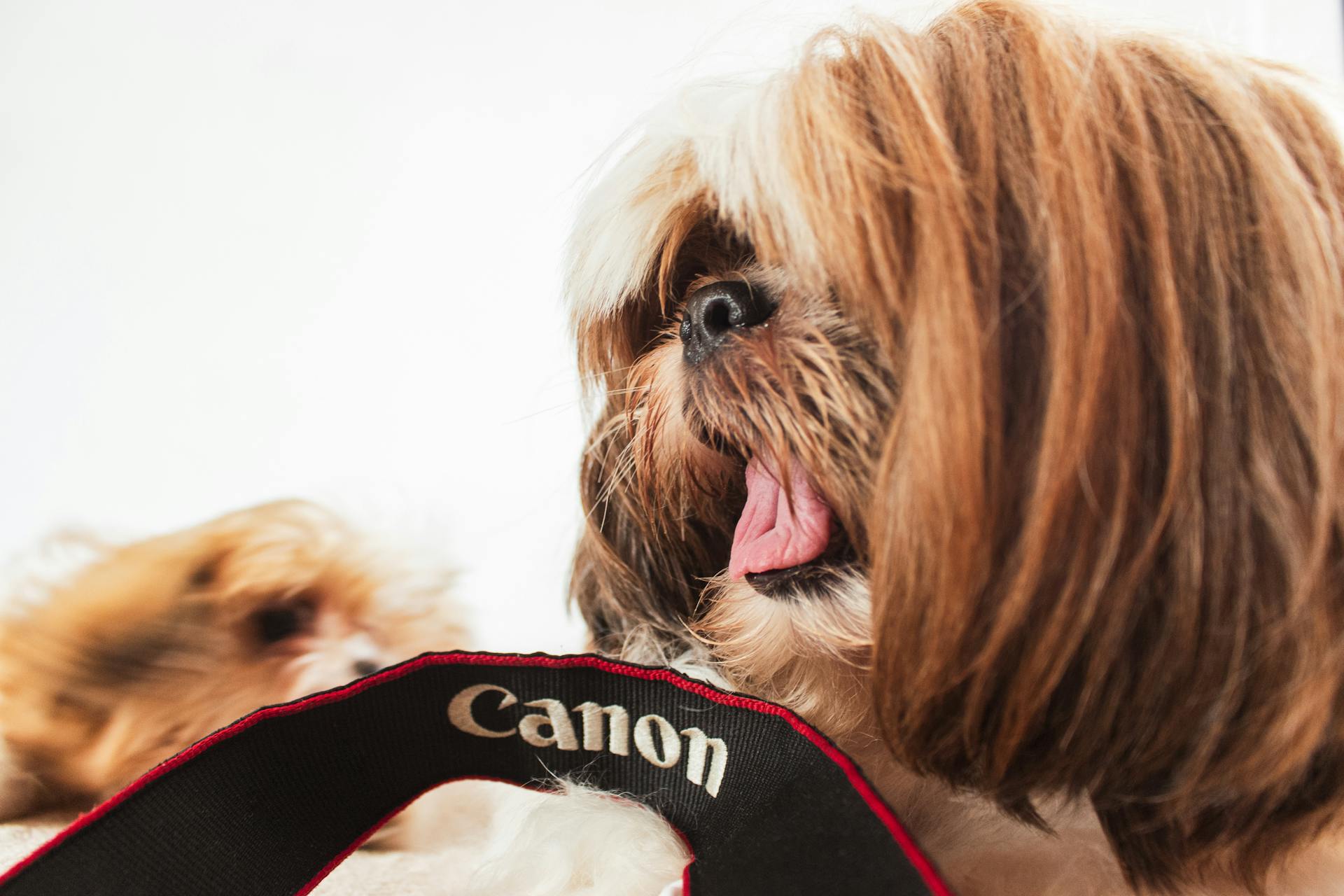
The Shih Tzu breed is a beloved companion dog known for its friendly, outgoing personality. They originated in Tibet and were later bred in China as palace dogs for royalty.
Their small size, typically weighing between 9-16 pounds, makes them a great fit for apartment living. They have a long, flowing coat that requires regular grooming.
Shih Tzus are known for their loyalty and affection towards their owners, making them excellent family pets. They are also generally good with children, especially if socialized from an early age.
Their friendly demeanor can sometimes make them wary of strangers, so early socialization is key to helping them feel comfortable around new people.
Take a look at this: Are Maltese Dogs Friendly
Physical Characteristics
Shih Tzus are naturally great at looking pretty, with their large, expressive eyes that are usually brown, and their button nose, typically black or brown.
Their ears are larger than you might expect and tend to hang down like pendants.
The breed's generous double coat of long, flowing hair comes in a variety of colorways, including black and white, brown, silver, and red.
This coat can grow so long and thick that the dog looks like a ball of fluff, mainly due to their tiny body and short legs that leave them close to the ground.
Shih Tzus typically don't grow taller than 11 inches in height.
Their weight usually falls between 9 and 16 pounds.
Health
The Shih Tzu breed is generally a healthy one, with a long lifespan of up to 23 years, as shown by the oldest recorded Shih Tzu reaching that age.
However, like all dogs, Shih Tzus can be prone to certain health concerns. One notable issue is brachycephalic syndrome, which can lead to breathing difficulties, particularly in hot or humid weather.
Regular eye examinations by a veterinarian are crucial to catch and manage eye problems, such as corneal ulcers, progressive retinal atrophy, and dry eye syndrome.
Shih Tzus are also prone to dental problems, including tooth overcrowding and gum disease, due to their small mouths.
For more insights, see: Shih Tzu Good with Kids
Skin allergies are another concern for the breed, causing itching, redness, and hair loss, and can be managed by identifying and avoiding potential allergens.
Maintaining a healthy weight and providing regular, low-impact exercise can help reduce the risk of orthopedic problems like hip dysplasia and luxating patella.
Here are some common health concerns and recommended tests for Shih Tzus:
- Intervertebral Disc Disease, Eye Problems, Brachycephalic Syndrome
- Eye Examination, Blood And Urine Protein Screens, Skeletal, X-Rays, Physical Examination
Care and Maintenance
Shih Tzus are relatively low-maintenance pets when it comes to exercise, requiring only half an hour's activity a day or six miles a week walking.
Their fur, on the other hand, is a different story. Shih Tzus shed less than other breeds, but they still need regular grooming to prevent matting and tangling. Daily brushing, especially of the top knot and beard hair, is a must.
Regular bathing is also necessary, ideally once a week. Dirty coats are much more likely to tangle, making grooming a nightmare.
To keep your Shih Tzu's coat clean and healthy, you'll need to brush and comb their coat every day if you want to keep it at a naturally long length. If you prefer a shorter coat, regular trips to the groomer or learning to groom yourself will be necessary.
Here's a list of the best brushes for a Shih Tzu:
- Pin comb
- Pin brush
- Slicker brush
Remember, Shih Tzus are prone to dental issues due to their slight underbite, so regular tooth brushing is crucial to prevent problems like abscesses and gum disease.
Maintenance
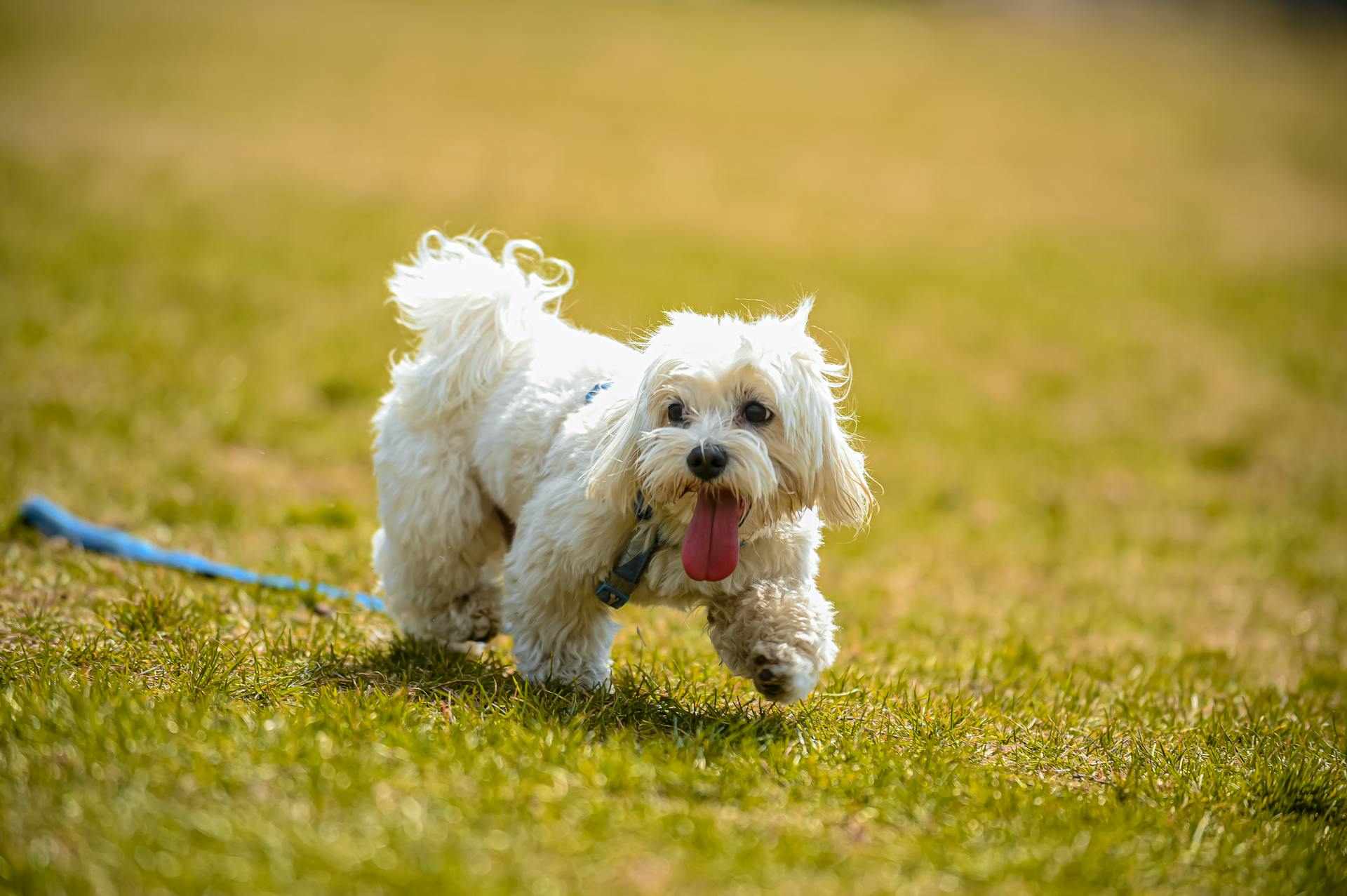
Maintenance is a crucial aspect of Shih Tzu care. They require regular grooming to prevent matting and tangling of their long, dense coat.
Daily brushing is essential, especially of the top knot and beard hair. This will keep their coat clean and prevent dirt from building up.
Shedding is a concern, but Shih Tzus typically shed less than other breeds. However, there's an intense period of fur loss at the two-year stage when the juvenile coat is replaced by the mature one.
To simplify maintenance, many owners choose to keep their Shih Tzu's coat trimmed short. This still requires regular brushing and combing every two or three days.
In addition to grooming, Shih Tzus need regular dental care to prevent overcrowding and issues like abscesses and gum disease. Brushing their teeth daily can help keep these problems at bay.
Here's a rough guide to Shih Tzu grooming needs:
Shih Tzus don't require a lot of exercise, but they do need regular activity to stay healthy. Half an hour of activity a day or six miles of walking a week should suffice.
Exercise Requirements
Shih Tzus don't require a high level of physical exercise to stay in shape, making them a great choice for apartment dwellers or those with limited mobility.
A short daily walk and some playtime with their human family or other dogs in the home are perfect for keeping them active. You might even catch them getting the "puppy zoomies" every once in a while, which is completely normal.
Heavy exercise or exercise in warmer temperatures should be avoided to prevent health issues, especially heatstroke symptoms like heavy panting, drooling, bright red tongue or gums, rapid pulse, and wide, panicked eyes.
Shih Tzus need regular breaks to rest and cool down, especially in summer, due to their brachycephalic (flat-faced) breed.
Here's a rough guide to their exercise needs:
Nutrition and Diet
When feeding your Shih Tzu, it's essential to consider their small stature and sedentary lifestyle to avoid overfeeding. This can lead to health problems, so it's crucial to monitor their food intake.
Their breed can be prone to heart disorders and spinal problems, which can be exacerbated by obesity, making a healthy diet even more important. A combination of dry kibble and moist food can give them variety and help keep them healthy.
Shih Tzus can be fussy eaters, so offering a mix of textures can be beneficial. Regular-sized dry food can pose a choking hazard due to their Shih Tzu-sized jaws, so choose the right kibble size for your pet.
Feed your Shih Tzu twice a day, sticking to portion size guidelines and considering their age, lifestyle, and activity level. Ask your vet for advice on the amount of food to give your pet to ensure you're meeting their nutritional needs.
Here are some key feeding tips for your Shih Tzu:
- Feed breed-appropriate food twice a day
- Consider their age, lifestyle, and activity level when determining portion size
- Choose the right kibble size to avoid choking hazards
Temperament and Training
The Shih Tzu breed is known for being pleasant company, loving attention and playtime, and sleeping in their parent's lap. They're typically very good-natured, but can have a stubborn streak which can complicate things.
Shih Tzus were bred as alert dogs, trained to let larger guard dogs know someone was approaching by barking. However, they've found their niche as the perfect lap dog for Chinese royalty, and they love being companions.
Shih Tzus are affectionate, playful, and extroverted, but can be a little stubborn at times. They relish human company and are happiest when they're at your feet or side.
This breed tends to be wary of strangers and prefer getting to know people on their own terms, meaning they need lots of socialization as puppies. They're usually comfortable with other dogs and pets, as long as introductions are careful.
Shih Tzus don't tolerate rough play and can be quick to make their feelings known, especially with small children. They're best suited for owners who can be home most of the time.
Here are some key points to keep in mind when considering a Shih Tzu as a pet:
- Start training from 8 weeks old to avoid a stubborn streak.
- Keep training sessions short, around 5-10 minutes, to prevent boredom.
- Provide plenty of mental enrichment, such as daily training for obedience and tricks, to keep their minds engaged.
- Exercise should include plenty of chances to rest and cool down, especially in summer.
- Hide and seek and 'lucky dip' games are great ways to keep your Shih Tzu entertained.
Shih Tzus can be prone to separation anxiety, so they should only be left alone for short periods of time. With proper training and socialization, they can make wonderful companions.
Socialization and Ownership
Socialization is key when it comes to Shih Tzus. Proper proactive exposure to new sights, sounds, people, dogs, and other animals as a young puppy is essential for their socialization.
Shih Tzus are known for being outgoing and social, and they do well with children due to their sweet nature and sturdiness. However, it's crucial to introduce them properly and supervise interactions between young children and dogs.
To ensure a smooth transition, provide your Shih Tzu with a safe space where they can retreat when needed. This will help them feel secure and reduce stress.
Here are some essential tips for responsible Shih Tzu ownership:
- Choose a licensed and reputable Shih Tzu breeder if you're buying a puppy.
- Be realistic about how much time you have for training, as Shih Tzus can be challenging to train due to their independent streak.
- Look carefully at the veterinary cover provided when shopping around for pet insurance, as not all policies are the same.
Social Skills
Shih Tzus are known for being outgoing and social, making them a great fit for families with children.
Proper proactive exposure to new sights, sounds, people, dogs, and other animals as a young puppy is essential for their socialization.
They can do well with children, thanks to their sweet nature and sturdiness, but it's crucial to introduce and socialize them properly as a puppy.
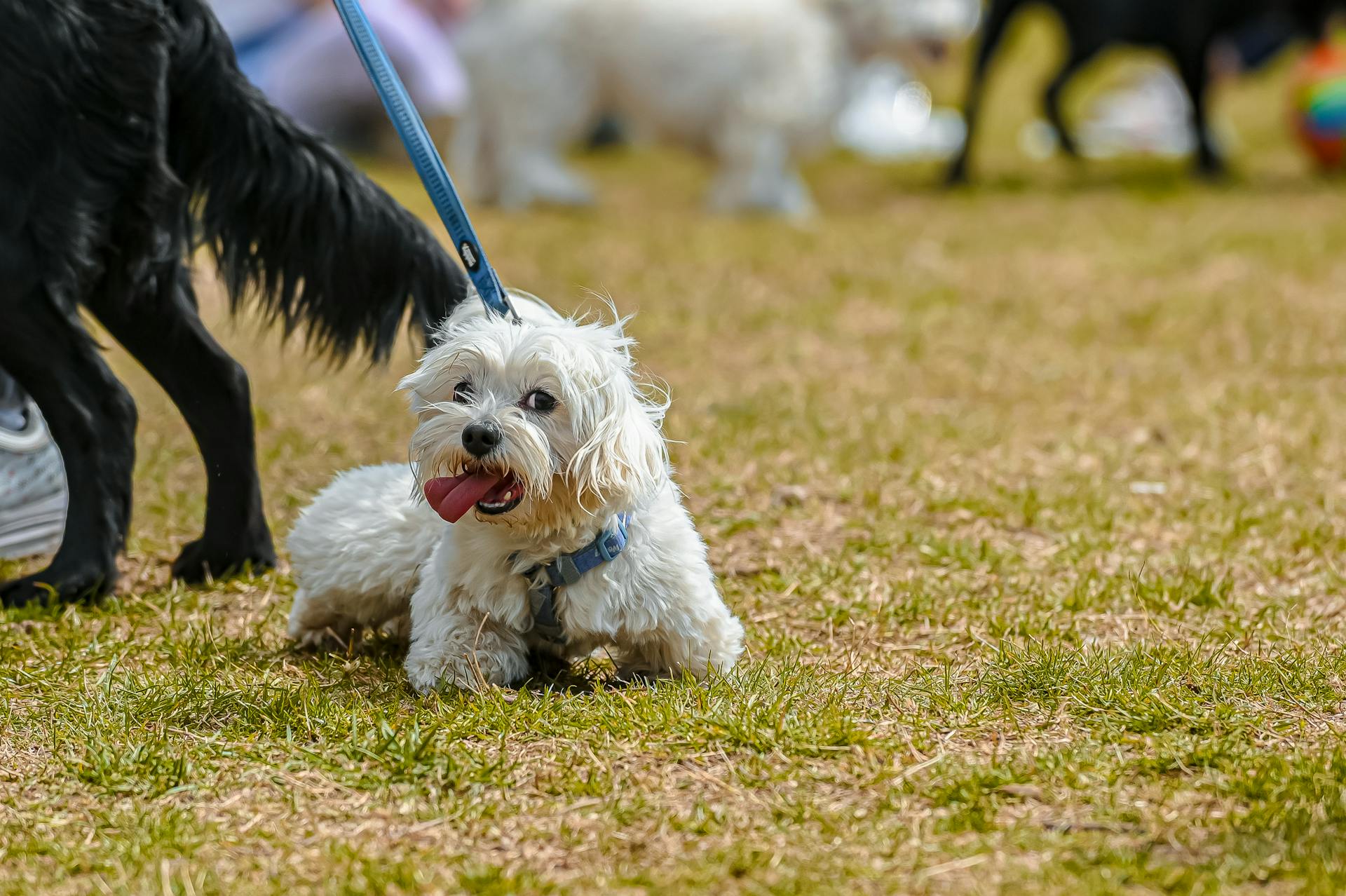
Young children and dogs should always be supervised, and it's helpful for a dog to have their own "safe space" where they can go when they need some quiet time.
Shih Tzus can enjoy the companionship of other animals in the home, as long as they've been properly socialized since puppyhood and introduced.
Owner Experiences
Socialization and Ownership can be a challenge, especially when it comes to our furry friends. Many Shih Tzu owners have reported issues with allergies, with one owner stating their dog has severe seasonal and environmental allergies that no treatments have fully helped.
Malassezia is a common issue that can affect both dogs and their owners. It's a type of fungus that can be found on the skin of dogs, but it's also possible for it to be present on human skin.
A Shih Tzu's body hair can take time to grow back after a low cut. One owner mentioned that it can take a while for their dog's hair to regrow.
Readers also liked: Is Lhasa Apso Good for First Time Owners
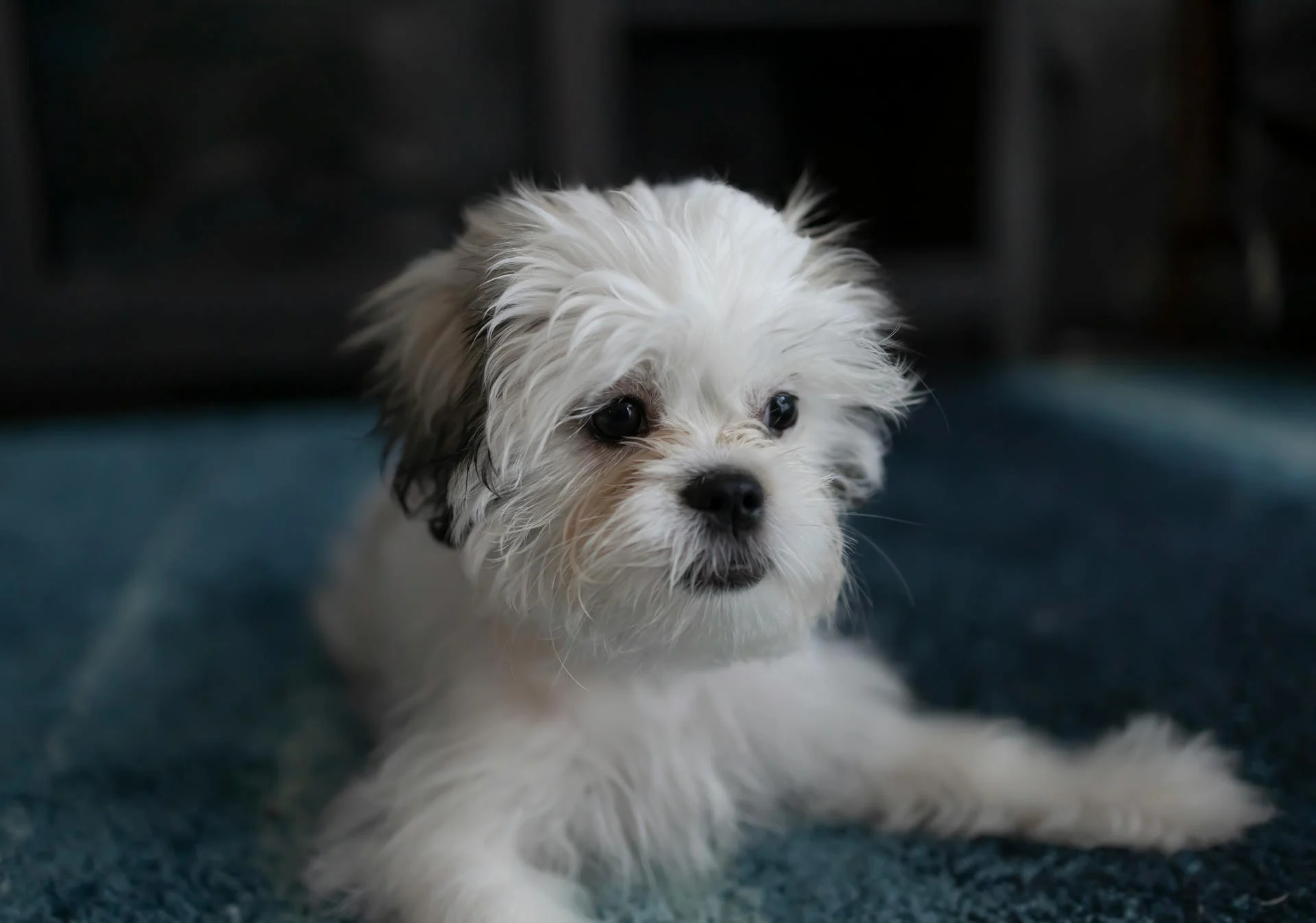
Some Shih Tzus can be prone to skin issues, such as dermatitis. One owner reported that their dog was shaking her head and scooting her butt, which could be a sign of dermatitis or another skin issue.
Dust mites and ticks can be common culprits behind skin issues in dogs. One owner mentioned that their dog got ticks from their grandma's place and may be experiencing skin issues as a result.
It's essential to keep an eye out for any unusual growths or worms on your dog's body. One owner noticed a growth in their dog's tail that looked like a worm and was hurting her.
Regular check-ups with a veterinarian can help identify and address any skin issues early on. One owner mentioned that their dog's allergies have been a challenge to manage, but they're working with their vet to find a solution.
Prospective Owners
As a prospective owner, it's essential to consider the needs and personality of a Shih Tzu. They're known for being outgoing and social, which makes them great companions for families.
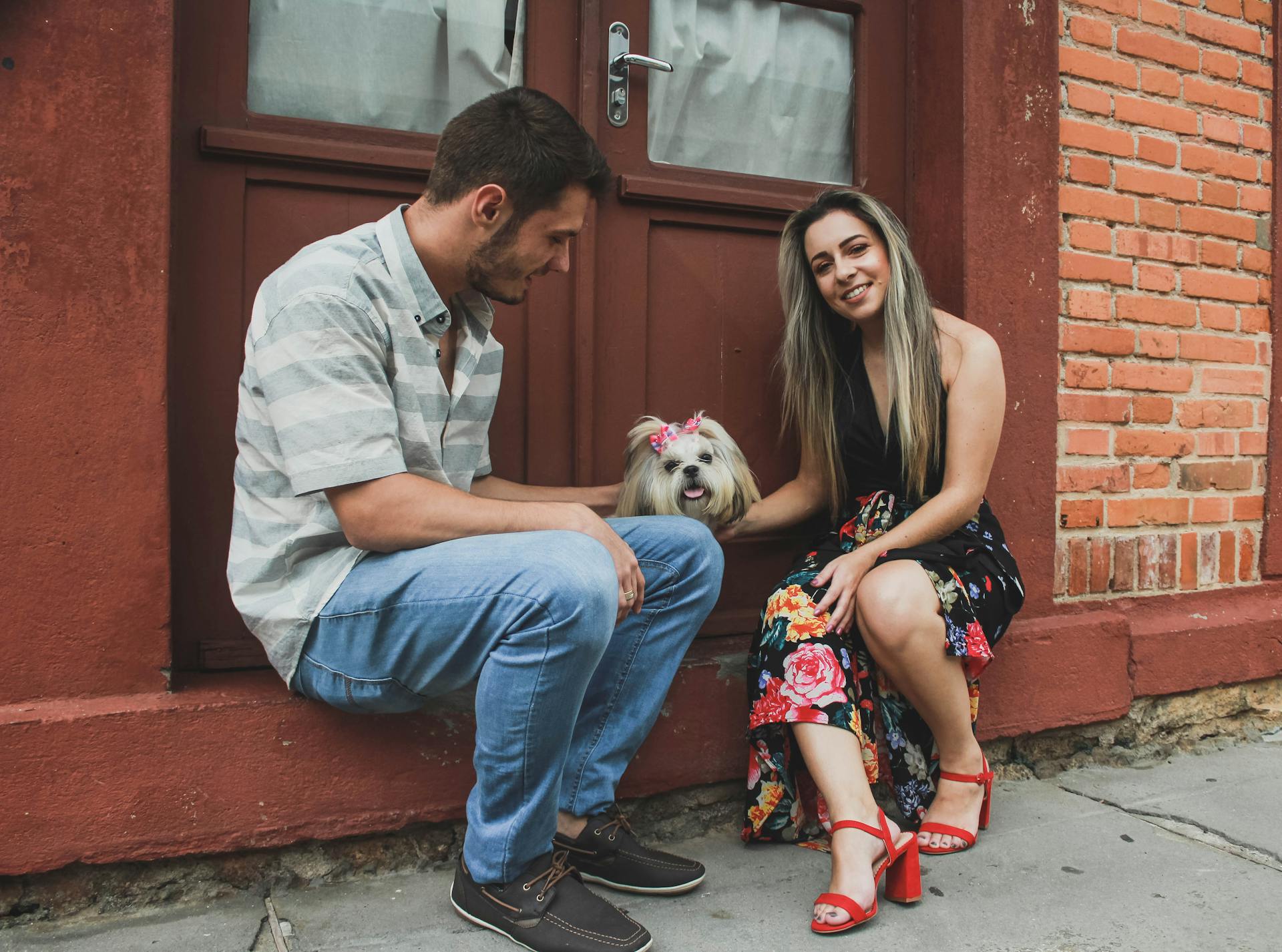
To ensure a smooth transition, it's crucial to socialize your Shih Tzu from an early age. Proper exposure to new sights, sounds, people, dogs, and other animals is vital for their development.
Here are some key things to keep in mind when getting a Shih Tzu:
- Choose a licensed and reputable breeder to ensure you're getting a healthy puppy.
- Be prepared for training challenges due to their independent streak.
- Research pet insurance carefully to ensure you're covered for potential health issues.
With the right care and attention, a Shih Tzu can thrive in a loving home.
Frequently Asked Questions
Is a Shih Tzu a good house dog?
Yes, Shih Tzus can make great house dogs for families due to their gentle and affectionate nature. However, proper socialization and regular exercise are essential to ensure they thrive in a home environment.
What are the pros and cons of a Shih Tzu?
Shih Tzus are friendly, loyal, and low-maintenance pets, making them a great choice for many families. However, their stubborn nature can be a challenge for some owners to manage.
Does a Shih Tzu bark a lot?
Shih Tzus are generally quiet dogs, rarely barking excessively, but may bark at triggers like doorbells, visitors, or outside noises. They tend to be calm companions, making them a great choice for apartment living or noise-sensitive environments.
What dog looks like a Shih Tzu but bigger?
The Lhasa Apso is a larger dog breed that resembles the Shih Tzu in size and structure. It's slightly taller, measuring between 10 and 11 inches at the shoulder.
What dog breed is similar to Shih Tzu?
The Lhasa Apso is a dog breed that closely resembles the Shih Tzu in appearance. Discover more breeds like the Shih Tzu by reading on to learn about the top 7 similar breeds.
Featured Images: pexels.com


